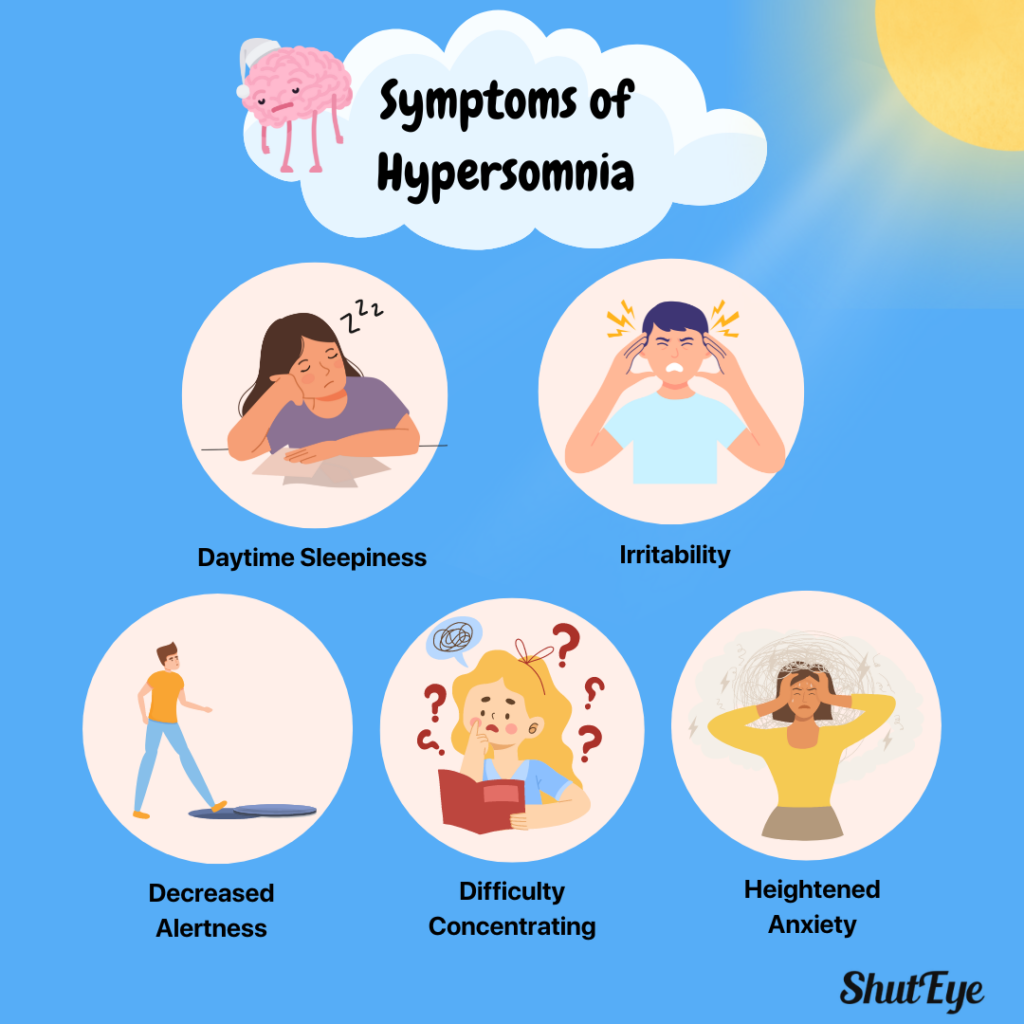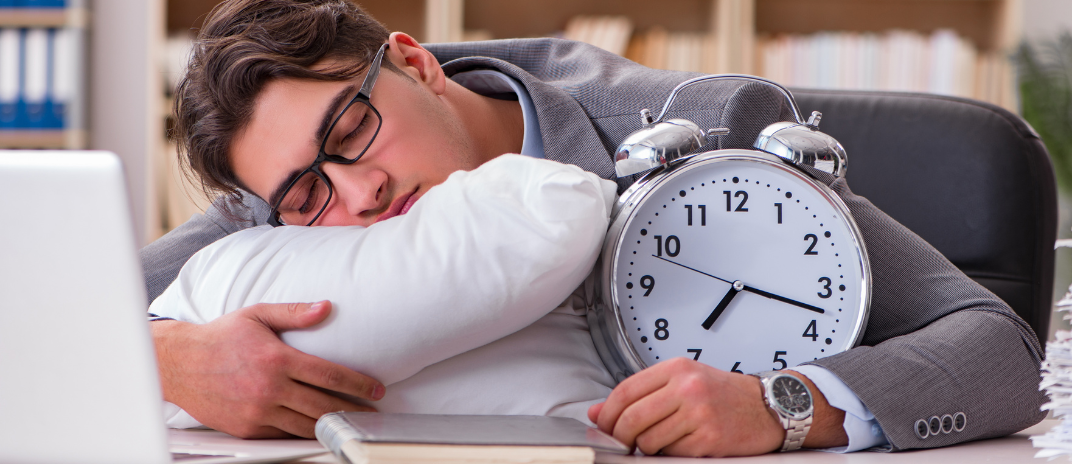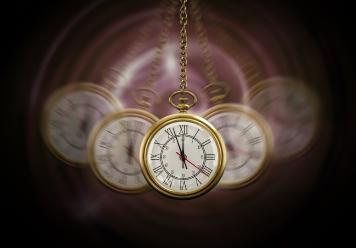Do you struggle with constant daytime sleepiness, long sleep durations, and difficulty waking up? Explore the symptoms, causes, and treatments of Hypersomnia in this article. Gain insights into how this disorder impacts your daily life and learn about effective management strategies.
By understanding this condition, you can take control of your sleep patterns and improve your quality of life.
What Is Hypersomnia?
Hypersomnia is a sleep disorder that causes too much daytime sleepiness or sudden episodes of Rapid Eye Movement (REM) sleep while awake. It also leads to hypnagogic and hypnopompic hallucinations and disrupts sleep patterns. In some cases, a small number of individuals may experience unconscious dream behavior.

Symptoms of Hypersomnia
Experiencing excessive daytime sleepiness is the primary symptom of hypersomnia. You may find yourself struggling to stay awake during the day, despite getting enough sleep at night.
People with hypersomnia often feel an overwhelming urge to nap throughout the day. Feeling sleepy at work which can affect your performance and social interactions. In addition to constant afternoon sleepiness, individuals with this condition may experience long sleep durations, difficulty waking up, and non-refreshing naps.
These symptoms can lead to irritability, decreased alertness, heightened anxiety, and difficulties concentrating. If you suspect you may have hypersomnia, it’s essential to consult a healthcare professional for proper diagnosis and treatment to improve your quality of life.

Diagnostic Criteria for Hypersomnia
Struggling with excessive daytime sleepiness is a key aspect in diagnosing hypersomnia, requiring a comprehensive evaluation for confirmation.
- Multiple sleep latency test (MSLT) to assess daytime sleepiness
- Polysomnography to evaluate sleep patterns and rule out other conditions
- Sleep diary to track sleep-wake patterns and symptoms
- Epworth Sleepiness Scale to quantify the severity of daytime sleepiness
These diagnostic criteria help healthcare providers differentiate hypersomnia from other disorders with similar symptoms, ensuring accurate identification and appropriate treatment strategies.
Causes of Hypersomnia
One of the primary factors that can contribute to hypersomnia and oversleeping is believed to be dysfunction in the brain’s regulatory mechanisms for wakefulness and sleep. This dysfunction can disrupt the balance between the systems that promote alertness and those that induce sleep, leading to excessive daytime sleepiness.
While the exact cause of this dysfunction isn’t fully understood, it’s thought to involve abnormalities in neurotransmitters or receptors that play a role in regulating sleep-wake cycles. Genetic factors may also contribute to the development of idiopathic hypersomnia, as it can sometimes run in families.
Additionally, certain environmental factors or triggers may exacerbate symptoms in individuals predisposed to this condition.

Differentiating Hypersomnia From Other Disorders
To differentiate hypersomnia effectively, consider the following:
- Look for excessive daytime sleepiness lasting at least 3 months.
- Rule out other sleep disorders like narcolepsy or sleep apnea through proper testing.
- Pay attention to prolonged nighttime sleep duration exceeding 9 hours.
- Consider the absence of cataplexy or clear triggers for excessive sleepiness.
Related content:
Why Am I Sleeping Too Much All of A Sudden?
Treatment Of Hypersomnia
Medications such as Modafinil, Armodafinil, and Sodium Oxybate are commonly used to promote wakefulness and help manage excessive daytime sleepiness. These medications work by affecting certain chemicals in the brain to improve alertness during the day.
Additionally, incorporating lifestyle changes can also play a significant role in managing idiopathic hypersomnia. Maintaining a consistent sleep schedule, creating a relaxing bedtime routine, avoiding stimulants close to bedtime, and ensuring a comfortable sleep environment can all contribute to better sleep quality and overall management of symptoms.

Medication Options
Consider using the medication options available for managing hypersomnia to improve your daytime alertness and reduce excessive sleepiness.
- Modafinil: Stimulant that promotes wakefulness
- Armodafinil: Similar to Modafinil, aiding in staying awake
- Sodium Oxybate: Central nervous system depressant to enhance nighttime sleep
- Methylphenidate: Central nervous system stimulant to improve alertness
These medications can help regulate sleep-wake cycles and combat the extreme sleepiness associated with hypersomnia.
It’s essential to consult with a healthcare provider to determine the most suitable medication option based on your individual symptoms and overall health.
Remember that medication is just one aspect of managing hypersomnia, and lifestyle modifications play a vital role in enhancing treatment effectiveness.
Lifestyle Modifications
For managing hypersomnia effectively, focus on making lifestyle adjustments to support your treatment plan. Incorporating simple changes in your daily routine can significantly impact your symptoms. Below are some practical lifestyle modifications to consider:
| Lifestyle Modification | Description | Benefit |
|---|---|---|
| Maintain a Consistent Schedule | Establish regular sleep and wake times | Regulate your body’s internal clock |
| Create a Relaxing Bedtime Routine | Wind down with calming activities before sleep | Improve sleep quality and promote relaxation |
| Avoid Stimulants Before Bed | Steer clear of caffeine and nicotine close to bedtime | Enhance sleep onset and quality |
Cognitive-Behavioral Strategies for Hypersomnia
You can improve your management of hypersomnia by implementing cognitive-behavioral strategies. These strategies can be beneficial in addressing the psychological aspects of hypersomnia and improving your overall quality of life.
Consider the following tips to help you cope with hypersomnia effectively:
- Practice relaxation techniques before bedtime to promote better sleep quality.
- Establish a consistent sleep schedule to regulate your circadian rhythm.
- Engage in regular physical activity to enhance your overall well-being and reduce daytime sleepiness.
- Keep a sleep diary to track your sleep patterns and identify any triggers that may worsen your symptoms.
Impact on Daily Life
In managing hypersomnia, the impact on your daily life surfaces during crucial moments when alertness is required. The excessive daytime sleepiness characteristic of hypersomnia can significantly interfere with your ability to stay awake and attentive throughout the day, affecting various aspects of your daily routine. Below is a table illustrating the potential impact of hypersomnia on your daily life:
| Impact of Idiopathic Hypersomnia on Daily Life | Examples |
|---|---|
| Work Performance | Difficulty concentrating during meetings |
| Social Interactions | Struggling to stay engaged in conversations |
| Daily Tasks | Feeling drowsy while driving or cooking |
| Leisure Activities | Falling asleep during movies or outings |
Research and Developments in Hypersomnia
Research reveals promising advancements in understanding the underlying mechanisms of this condition through collaborative studies and innovative technologies.
Recent studies suggest a potential genetic component contributing to hypersomnia. Brain imaging techniques, such as functional MRI, offer insights into the neurological basis of excessive daytime sleepiness. Emerging therapies targeting specific neurotransmitter systems show promise in managing symptoms of hypersomnia.
Ongoing clinical trials are investigating the efficacy of novel treatment approaches, providing hope for improved outcomes for individuals with this challenging disorder.
Support Resources
Explore available support resources for managing hypersomnia in collaboration with healthcare professionals and support groups. Healthcare providers specializing in sleep disorders can offer tailored treatment plans and monitor your progress.
Online forums and support groups provide a platform to connect with others facing similar challenges, allowing for shared experiences and coping strategies. Educational resources from reputable sources like the American Sleep Association and Hypersomnia Foundation offer valuable information on managing hypersomnia.
Additionally, counseling services can help address the emotional impact of living with a chronic sleep disorder. Seeking support from loved ones and caregivers can also play a crucial role in managing the daily struggles associated with hypersomnia.
Management Strategies
Implement tailored management strategies to effectively address the symptoms and improve your quality of life.
- Establish a Consistent Sleep Schedule: Going to bed and waking up at the same time daily can regulate your body clock.
- Create a Relaxing Bedtime Routine: Engage in calming activities before bed to signal your body that it’s time to wind down.
- Avoid Stimulants: Steer clear of caffeine and other stimulants close to bedtime to promote better sleep.
- Consider Cognitive-Behavioral Therapy for Insomnia (CBT-I): This therapy can help address underlying issues affecting your sleep patterns.
These strategies, when combined with proper medication and lifestyle adjustments, can significantly enhance your ability to manage hypersomnia effectively.
Conclusion
In conclusion, living with hypersomnia can be challenging, but with the right diagnosis, treatment, and management strategies, it’s possible to improve your quality of life and regain control over your sleep patterns.
By staying informed, seeking support, and making necessary lifestyle changes, you can effectively manage the symptoms of sleeping too much and lead a more fulfilling life.
Remember, you aren’t alone in this journey, and there are resources available to help you along the way.

















